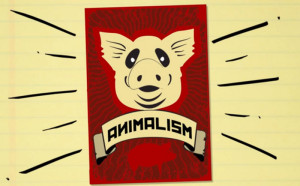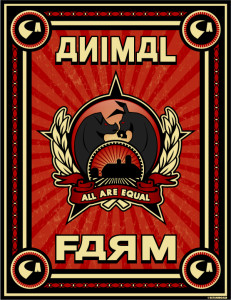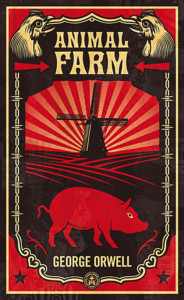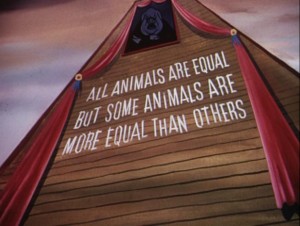We finished the class by watching the 1954 animated version of Animal Farm, directed by Joy Batchelor and John Halas, which is an interesting movie in its own right, but a very watered down version of Orwell’s allegory. I’m sure none of the men  were surprised that the ending of Animal Farm was depressing, but possibly some were disturbed to realize just how terrible things finally got. But I have to say, most of the animals were asking for it. They followed the pigs blindly and naively; they didn’t pay attention to what was going on around them; they trusted that Napoleon had their best interests at heart, they forgot the past, and they didn’t look out for themselves.
were surprised that the ending of Animal Farm was depressing, but possibly some were disturbed to realize just how terrible things finally got. But I have to say, most of the animals were asking for it. They followed the pigs blindly and naively; they didn’t pay attention to what was going on around them; they trusted that Napoleon had their best interests at heart, they forgot the past, and they didn’t look out for themselves.
At the beginning of Chapter 10, years have passed since the rebellion. Many of the animals involved in it are dead. Most of its ideals and promises are dead as well. The younger animals simply accept Napoleon’s historical account and the way he runs the farm. They are now far worse off under Napoleon than under Mr. Jones. The windmill, before it’s exploded, is used to mill corn and increase profits. The pigs, under Napoleon, have become worse than the humans. The commandments have been changed so that the pigs are considered superior to the others.
This is a very cynical story. Orwell seems to be suggesting that all power corrupts. There’s no way out. In our own lives, we can either join the pigs, and become corrupted, or go on quietly with our own lives, and be led blindly and naïvely. There is a moment of potential enlightenment when seems as though thing s could be turned around when Boxer is taken away to the slaughterhouse, and Benjamin has a heroic moment when he tries to mount a rescue operation. But in the end, even Benjamin is cynically resolved to the disastrous fate of pig rule.
s could be turned around when Boxer is taken away to the slaughterhouse, and Benjamin has a heroic moment when he tries to mount a rescue operation. But in the end, even Benjamin is cynically resolved to the disastrous fate of pig rule.
There can be no actual hero on Animal Farm because totalitarianism eliminates all heroism. There can be no daring individual acts because all such acts end in death. On Orwell’s Animal Farm, it may well be that cynicism is not just an optional disposition; it is a duty. It is the only possibility of opposition. It’s the realist’s version of hope, the only disposition that can penetrate beyond the implacable barriers of oppression. The cynic does not accept power, but nor does he accept the tyranny of the status quo. As usual, another depressing book to end the course.


